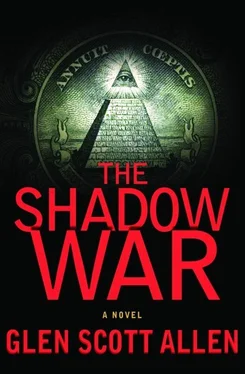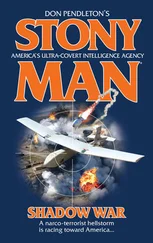Glen Allen - The shadow war
Здесь есть возможность читать онлайн «Glen Allen - The shadow war» весь текст электронной книги совершенно бесплатно (целиком полную версию без сокращений). В некоторых случаях можно слушать аудио, скачать через торрент в формате fb2 и присутствует краткое содержание. Жанр: Триллер, на английском языке. Описание произведения, (предисловие) а так же отзывы посетителей доступны на портале библиотеки ЛибКат.
- Название:The shadow war
- Автор:
- Жанр:
- Год:неизвестен
- ISBN:нет данных
- Рейтинг книги:5 / 5. Голосов: 1
-
Избранное:Добавить в избранное
- Отзывы:
-
Ваша оценка:
- 100
- 1
- 2
- 3
- 4
- 5
The shadow war: краткое содержание, описание и аннотация
Предлагаем к чтению аннотацию, описание, краткое содержание или предисловие (зависит от того, что написал сам автор книги «The shadow war»). Если вы не нашли необходимую информацию о книге — напишите в комментариях, мы постараемся отыскать её.
The shadow war — читать онлайн бесплатно полную книгу (весь текст) целиком
Ниже представлен текст книги, разбитый по страницам. Система сохранения места последней прочитанной страницы, позволяет с удобством читать онлайн бесплатно книгу «The shadow war», без необходимости каждый раз заново искать на чём Вы остановились. Поставьте закладку, и сможете в любой момент перейти на страницу, на которой закончили чтение.
Интервал:
Закладка:
They could hear the sounds of men on the other side of the oval door, unlocking its mechanism.
"What do you think?" asked Orlov. "Should we report it?"
Leverotov thought a moment. "Let me… look into it," he said. "I will let you know."
And then the hatch to the room was opened, and the process of handing over their records and keys began.
CHAPTER 44
The light in the basement of the church had dimmed a little as clouds moved overhead and blocked the sun. Nikolai was leaning back in his chair, while Benjamin sat forward in his. Benjamin realized his body had gone stiff with tension while he listened to Nikolai's story.
"Anton said something about 1968, about it being the time we truly came closest to nuclear war. But in the U.S. we never heard of this."
"Of course not," said Nikolai. "You didn't really care about the rebellion. It was all… theater to you."
"And this mysterious red light during the drill, this glitch… what did Leverotov find out about it?"
"Before I answer that question, there's something you must understand," Nikolai said.
Nikolai told Benjamin the same thing Anton had: after the Cuban Missile Crisis, a new protocol for the Soviet nuclear forces had been issued. And that protocol changed the way their missiles were targeted. Before that, each missile stored its individual target and guided itself once it was launched. But under the new protocol, Strategija Chetyre, the targeting codes were transmitted from Moscow Center only after the missiles were launched.
"That red light," Nikolai said. "It meant the targeting codes were being transmitted then, before launch. And next thing we know, new message comes from Moscow. Cancel alert. Stand down. Only 'training exercise.' All damn strange."
Then he explained to Benjamin that his early training at the military academy had been that of an engineer, as were most of the other rocketchiki, so he and his comrades were intimately knowledgeable about even the most technical details of their nest of nuclear-tipped ICBMs.
"More than just fingers on buttons," he said. "We must understand fuel, circuits, electronics… everything."
He told Benjamin that Vladimir Sergeyevitch Leverotov was someone who knew the insides of the rockets and all the facilities better than anyone. But this particular "bright guy" had come not from the Academy, like Nikolai, but rather from the Ministry of Defense. He'd graduated university as a mathematician before joining the Red Army, and then been assigned to something called the 12 Directorate in the Ministry of Defense.
"Anton mentioned that," Benjamin interrupted. "He said-"
"Please, wait," Nikolai said.
Nikolai and Leverotov had become fast friends. They were both ardent believers in the mission of the rocketchiki, which Nikolai described as "guarding the whole planet from the aggression of imperialistic states." Nikolai and Leverotov had had frequent discussions about the importance of what they were doing, about their "ideological certainty" that it was right and, more important, patriotic.
But Benjamin was still dealing with something else Nikolai had said.
"You actually believed NATO would attack? Over Czechoslovakia?"
"I know what you are thinking," Nikolai said. "Did we really believe we were the good guys, you were the bad guys?" Nikolai gave him a very serious look. "And would I have used this terrible weapon? The answer is yes, absolutely. We believed. And for those four weeks, with Czechoslovakia in chaos, we were very close to edge of making belief into reality."
The Czech crisis lasted another two weeks. By the time it was over, Nikolai told them, everyone of the underground watch group was exhausted, just wanted to go home. Nobody talked about the "glitch." It was considered unpatriotic to even suggest something had gone wrong.
But in the month after that, Nikolai noticed a change in Leverotov's behavior. He seemed preoccupied. He no longer told jokes, didn't participate in the political discussions in the relaxation building. He performed his duties, but something seemed to have dampened his spirit.
"More robot than true rocketchiki, " Nikolai said. And after that Leverotov spent more time than ever checking the "sausages," going over their circuits, running tests.
Nikolai said he was used to people lying to one another, hiding their true feelings; that was all part of the system, a part of it he eventually came to despise. But with Leverotov, he felt it was something more than that.
One day, after another drill, they were in the changing room together. Nikolai approached Leverotov, began talking about the drill. Finally he came out and asked Vladimir: Had he lost his belief? If the time came, would he still press the white button?
"You know what he answered?" Nikolai said. "He said, 'Yes, Nikolai, I would, without hesitation.' Of course he would say that. Microphones everywhere, someone always listening. But he is telling truth, I can tell. Then he looked very pechalno, very sad, and he said, 'But not for reason you would.' "
"What on earth did he mean?" Benjamin asked.
Nikolai shrugged. "Don't know. And never get chance to find out. Because of 'glitch,' KGB comes to investigate. To find somebody to blame. When mistake happens, always has to be a name for Moscow. Understand?"
"Yes," said Benjamin, "I think I do."
"Well," Nikolai went on, "day KGB comes to Uzhur-4, I'm nervous, of course. But I did my job, I think, it's okay. But Vladimir, I guess he didn't think same way."
"Why?" asked Benjamin.
"Because that day, before KGB talks to him, he shoots himself."
Natalya, who had sat silently through Nikolai's story and the two men's conversation, now spoke up.
"I remember something Mother told me," she said. "Something about you being absent for a month, instead of the usual ten days. And I remember, too, she said perhaps a month later, you returned from the base very quiet. You never told her why."
"As I said," Nikolai went on, "Vladimir was good friend. Such a thing, among the rocketchiki… well, it was very bad. Very bad. Of course, KGB talk to everyone, take all his things. Many people reassigned after that, sent to other bases, including me."
"Until you retired," said Benjamin. "Natalya told me about your… research."
Nikolai looked down at the floor. "Yes, that was part of it."
"Not all of it?" Natalya asked, coming closer.
Nikolai looked up at her, reached out for her hand.
"I could not tell you, Natashka. I could not tell your mother. I could not tell anyone. "
"Tell us what?" she asked, taking his hand.
Nikolai stood, went over to an empty chair. He picked up a small metal box, brought it back to them.
He held the box before them and slowly lifted the lid.
"About these," he said. "I call them my relics. And now, in this place, it seems a very good name."
Nikolai reached inside the box, took out two small objects. Benjamin noticed that he handled them as though they were indeed holy relics.
Nikolai held the objects out in his palm.
They were a crumpled, empty cigarette pack and a small wooden box for matches.
After Nikolai explained to them how he'd discovered them in his dress uniform tunic the day after Leverotov's suicide, he let Benjamin examine them.
The cigarette pack was green and blue, with " " (Shipka) stenciled on it in white letters. The matchbox had a red label with a picture of two raised hands, one with a hammer and the other with a sickle, a miniature rocket rising over them.
Benjamin shook the matchbox. Something inside rattled.
"Open it," Nikolai said.
Carefully, Benjamin slid the cover back. Inside, he could see matches, each with a blue tip, except for one.
"Thirty-four," said Nikolai, "counting the headless one. Now remove them."
Читать дальшеИнтервал:
Закладка:
Похожие книги на «The shadow war»
Представляем Вашему вниманию похожие книги на «The shadow war» списком для выбора. Мы отобрали схожую по названию и смыслу литературу в надежде предоставить читателям больше вариантов отыскать новые, интересные, ещё непрочитанные произведения.
Обсуждение, отзывы о книге «The shadow war» и просто собственные мнения читателей. Оставьте ваши комментарии, напишите, что Вы думаете о произведении, его смысле или главных героях. Укажите что конкретно понравилось, а что нет, и почему Вы так считаете.












